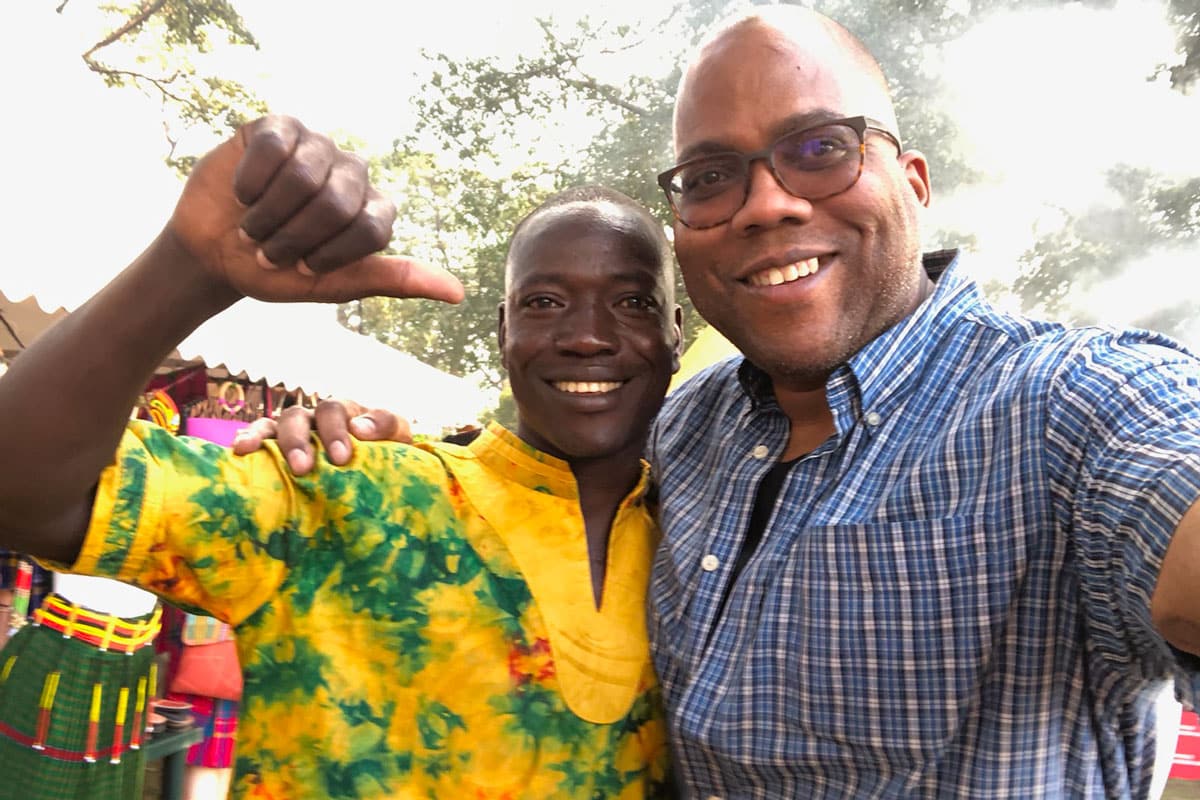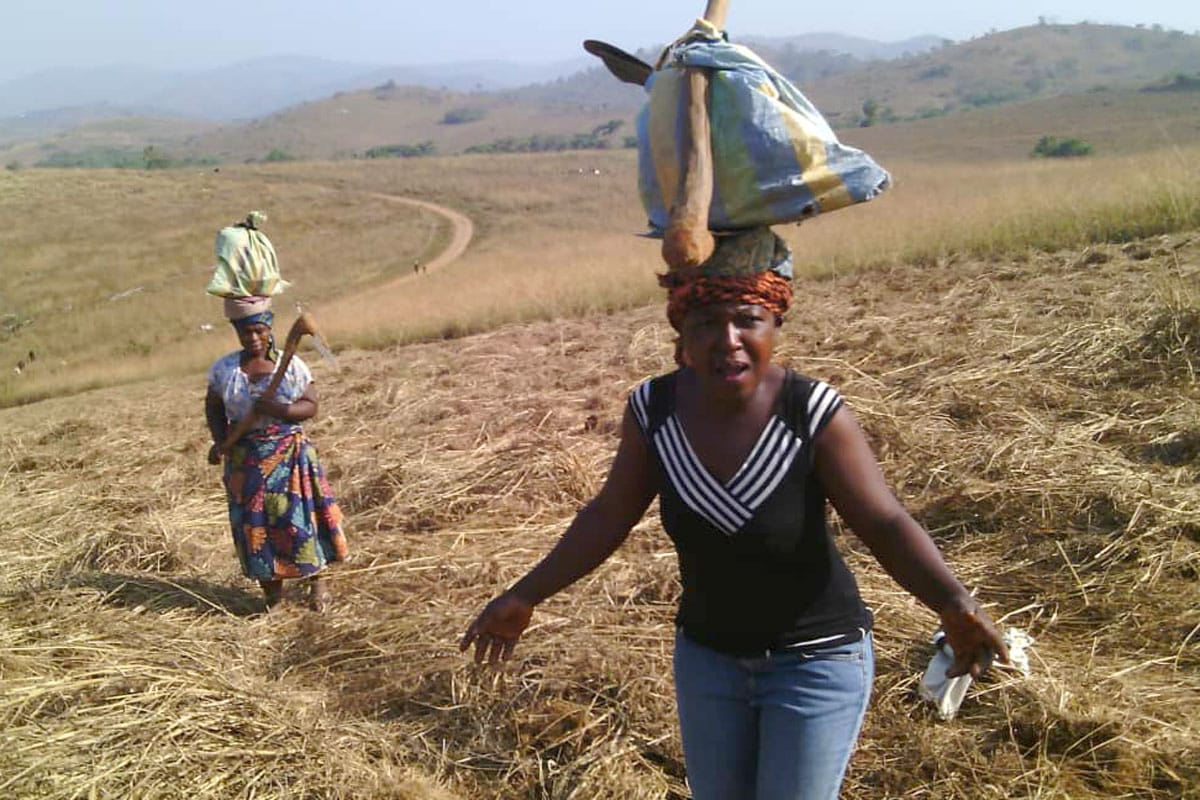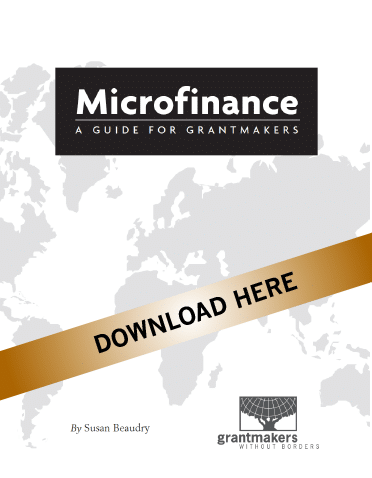United by STEM: One Team, Two Continents
featuring Dieudonne Allo and Jacquelyn Moore
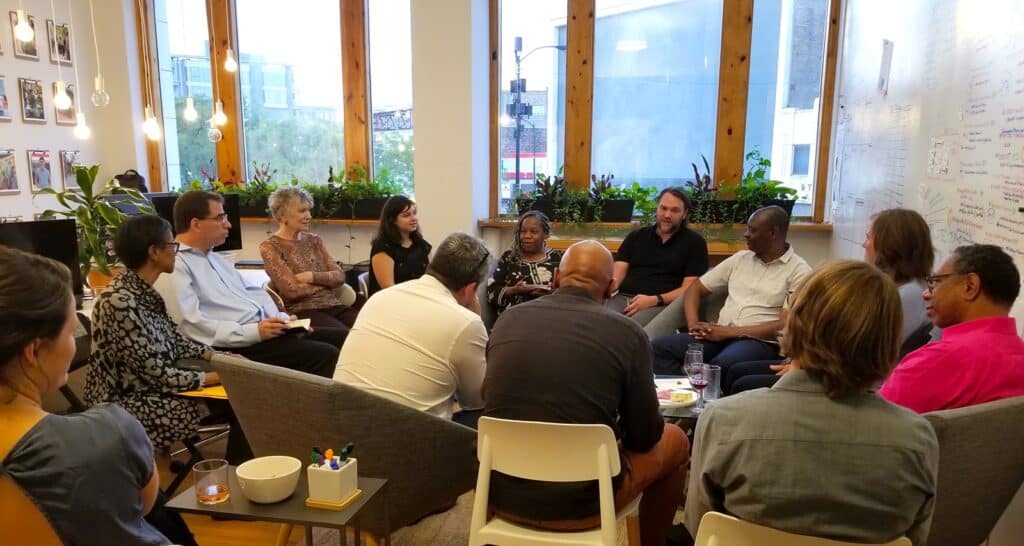
Two Goldin Fellows from South Africa and the USA (Dieudonne Allo and Jacquelyn Moore) are joining forces to convene young people with an interest in STEM and Robotics from Chicago (USA) and Port Alfred (South Africa) to collaborate as a unified team to compete in the FIRST® Innovation Challenge presented by Qualcomm.
Both seasoned professionals in teaching STEM through real world application in their respective countries, Dieudonne and Jacquelyn share a commitment to teaching robotics related skills to illustrate the value of engaging in a cross-continental collaboration with youth ages 13-19. For Inspiration and Recognition of Science and Technology (FIRST®) is a global community which seeks to empower and equip young people to become innovators in STEM, and foster life-long skills through inclusive team-based initiatives.
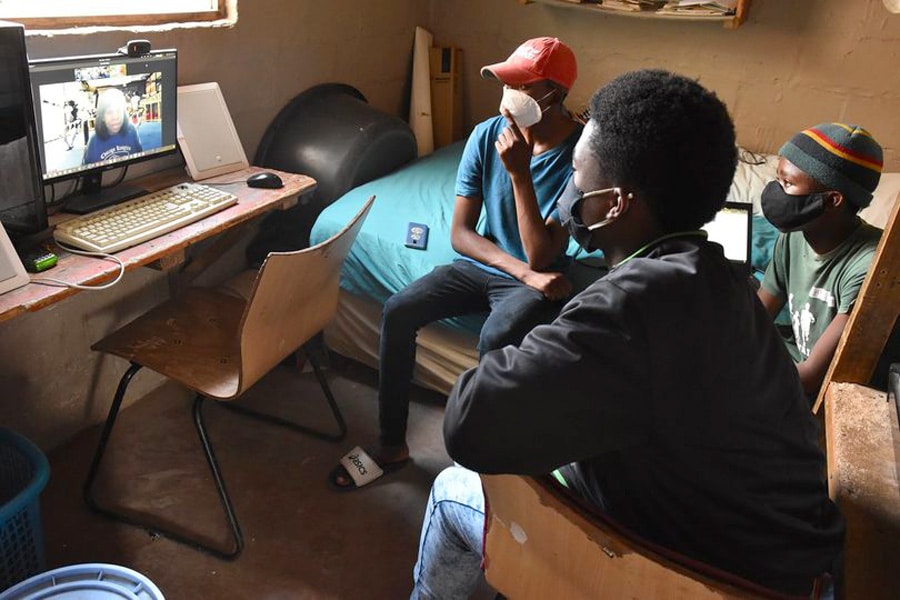
Allo is the CEO of the Global Leading Light Initiative, a non-profit in South Africa which supports young people in historically disadvantaged communities to acquire future proof skills, with the aim of reducing poverty and inequalities. Moore is the founder and Executive Director of Agape Werks, Inc, a community based non-profit in Chicago with a mission to promote in young people an appreciation of math, science, technology, and engineering as strategic tools for success regardless of life circumstances. In Agape Werks’ offerings, all skills will be learned and applied in an inclusive and collaborative environment that partners teens of various skill levels, interests, and heritage with caring and professional adults, all focused on the same goal.
Allo and Moore developed the “One Team Two Continents” concept in 2019 when they began exploring cross-continental collaboration opportunities after meeting through the Goldin Global Fellows program. This initiative envisions a youth-led, distributed team working together by using robotics related skills to meaningfully address common issues that impact their geographically dispersed communities.
The global pandemic led to FIRST® making their programs virtual, removing the need for participants to travel. One of these remote programs offered by FIRST® was the Global Innovation Challenge, a competition for teams to design a solution under the theme of ‘active play and movement’, for which youth from South Africa formally joined the Chicago Knights to compete in the 2020-21 FIRST® GAME CHANGERS℠ powered by Star Wars: Force for Change. In February of 2021, the youth began working together to submit a solution to the challenge:
“Identify a problem or opportunity to help people (or a community of people) keep, regain, or achieve optimum physical and/or mental health and fitness through active play or movement”.
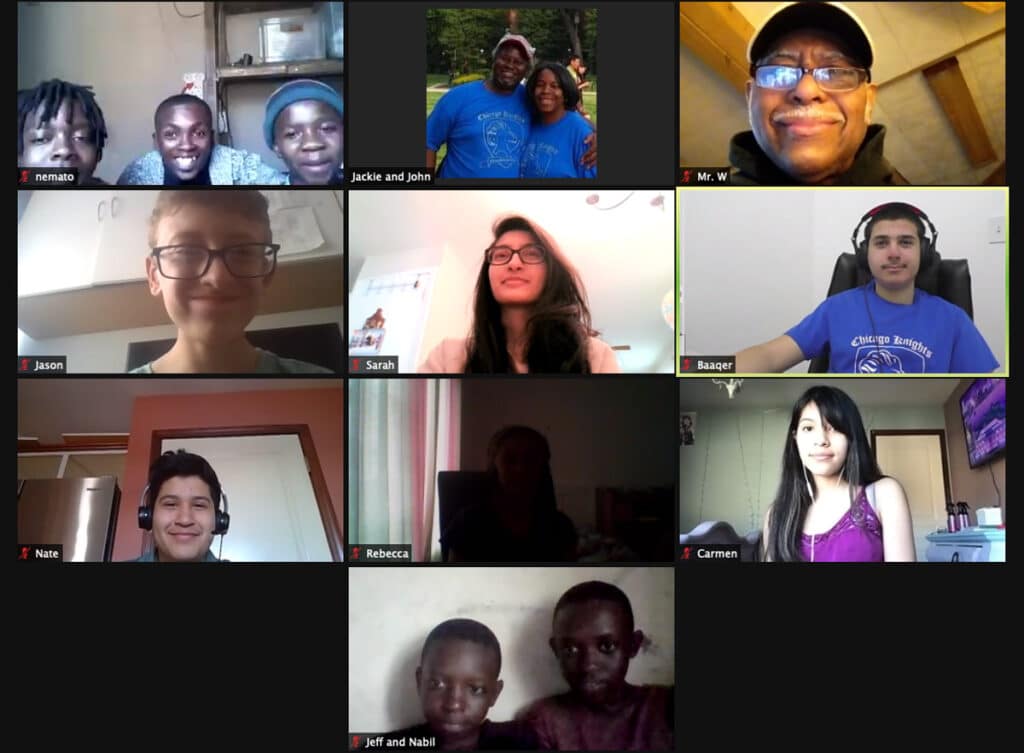
The team represents 2 continents, 3 countries, 8 unique primary languages, plus 5 unique languages team members are learning.
Each member has committed to meeting three days a week for at least 10 weeks, to learn from each other and to foster cross-cultural collaboration and sharing. Bringing together their combined knowledge, passions, insights, and interests, they have developed a solution based on cutting edge technology and empathy for their users. They are now focused on finalizing their business presentation and pitch. The team (the International Chicago Knights) will be pitching their solution to a panel of judges on April 3, 2021 and will share it with you here, soon after.
When asked why they joined the team, the youth responses ranged from “my mom wanted me to join, but now I really enjoy learning programming” (Rebecca, South Africa) to “I am interested in learning about and designing a robot” (Anathi, South Africa). Almost all of them are excited about learning to use the Python programming language. Team member Baaqer (USA) adds: “passion to discover new technologies and solve challenging problems in the purpose of helping people gives me the everyday encouragement to stay effectively committed to the challenge.”
Moore has led the mentoring and learning process during the 5 different sessions each week, with a diverse group of mentors and subject matter experts working with her. This includes team alumni, retired engineers, medical professionals, and business partners. Programming mentor, Sarah (graduate student, USA) volunteers because her “desire for constant learning is a significant motivation to be involved in this challenge. I want to learn, help, and work with others to solve problems!” The team members are learning a variety of business, technical, and interpersonal skills, and how to apply these skills to group problem solving. More importantly, the teens are learning new ways of communicating and gaining a deep understanding of creating universally accessible products.
“This extraordinary learning experience is not only imparting STEM-related skills, but it is also changing teens’ perceptions of themselves, others and life. At GLLI, one of the main challenges we have faced in our work with young people is their limited beliefs about themselves and others. ‘One Team Two continents’ is going beyond teaching them robotics and design skills to tackle this challenge in a significant way. The co-creation and excitement which I observe during sessions constantly raise the question, “How can we help more underserved teens to access this program?” —Goldin Global Fellow, Dieudonne Allo, South Africa.
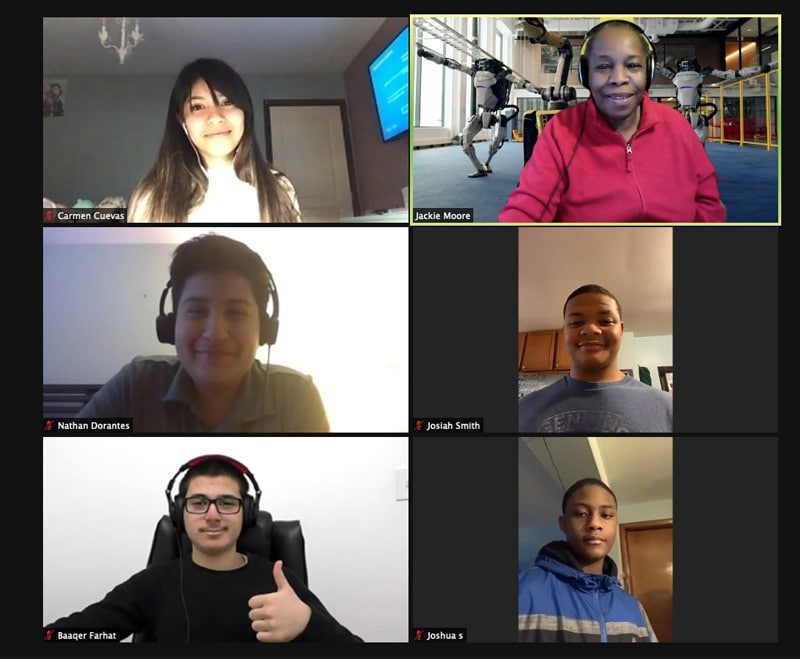
“This particular initiative is a concrete example of what we want to accomplish as partners. It’s an opportunity to test and prove that it can work. We are not chasing the trophy in this competition; we are chasing the goals, but if we get the trophy that’s icing on the cake.” — Chicago Peace Fellow, Jacquelyn Moore, USA.
To ensure the success of this initiative, the One Team Two Continents team needs your support.
Their process requires resources which most youth cannot afford and cannot access. The One Team Two Continents initiative would appreciate any help to obtain the following items. To make a contribution please visit the team’s PayPal page.
To support remote learning:
- Mobile hotspots (or home internet access)
- Internet capable computing devices (at least a smart phone or tablet)
- Webcams
- Microphones
- Headphones
Additionally, to support learning specific skills:
- Windows 10 computers with at least 8G RAM (for robotics specific software, also supports remote learning)
- three button USB mice (for 3D modeling and design)
- Electronics Project Kits
- Educational robot kits
To support bringing the product to market, cash, or in-kind donations of:
- Raw materials for fabrication (polycarbonate, acrylic, 3D filament)
- Graphics Artist (marketing purposes)
- Specific electronic components (sensors, micro controller, etc)
To Support travel when it is permissible, cash donations help pay for:
- Passport and Visa fees for students
- Travel Costs (local and abroad)
- Housing for students and mentors/chaperons
- Cultural experiences (local and abroad)
Transitions for our Director of Community Learning and Collaboration

This may not be my final contribution to the Goldin Instiute’s newsletter, but to be sure it is the most difficult to write.

After six years, I am leaving Goldin Institute to work with the Skoll Foundation in northern California. In my new role as a Principal of the foundation, I will help oversee grantmaking to social entrepreneurs throughout the world, as well as support collaborative funding efforts to better reach communities most in need.

Since the outset of my tenure at the organization, I have been blessed to not only gain a brother in arms and lifetime friend in Travis Rejman, but also get to know and work alongside some of the most dynamic, seemingly tireless people I’ve ever had the opportunity to meet. With no small degree of sadness, I will miss them profoundly.

The vision shared by Diane Goldin and Travis Rejman is one that captured my imagination with its raw clarity as well as its polished authenticity when I first learned of the Goldin Institute, and it still does. From my view at Skoll, I am committed to supporting that vision and the work of my colleagues to the fullest of my capacity.

To the larger community it has borne, I do hope I will still be seen as treated as a member, and ally. Though I will not formally be a part of the Goldin Institute’s working team I remain very active in supporting the individual efforts of its fellows and global partners, including the monthly roundtable dialogues.
GATHER Alum Supports Community Amidst Conflict in Cameroon
By Jimmie Briggs, Director of Learnign
In the last two weeks alone, more than 8,000 Cameroonian refugees have streamed across the border into neighboring Nigeria, fleeing an increasingly high intensity conflict between the national government and English-speaking militias seeking to form a breakaway state called “Ambazonia.” For Global GATHER alumnus Alexander Gwanvalla, the deteriorating situation has placed ever greater burdens on the work of his organization, Community Green Engagement. Speaking by phone last weekend from northwest Cameroon where he lives and works, Alexander described a crisis situation with food and resources rapidly dwindling.

“Farming activities are mostly carried out in rural areas and due to the deadly clashes happening now between soldiers and militias, farmers have fled and abandoned their farms,” he explained.
“This has resulted in dire food shortages because the food sources are no longer available. There is a state of insecurity, some of our members are also fleeing the country, and we are also facing ‘lockdown’ days where we cannot leave our homes and go to work because of the danger.” -- Alexander Gwanvalla
In total, 60,000 Cameroonian refugees have left the country for Nigeria, and even to the United States.

In practical terms, constant gunfire and risk of other physical violence by one of the warring groups makes it next to impossible for Alexander and his colleagues to meet with community decision-makers and thought-leaders. During last week’s elections on February 9, separatists from the English-speaking part of the country imposed a six-day lockdown on all civilian movement and reiterated their demand that English-speaking senators and parliamentarians quit the national senate and parliament. They’ve consistently threatened the lives of individuals who engage the legislative bodies in any way.

Last December, Cameroon’s parliament granted special status to the northwest and southwest regions of the country, which are predominantly English-speaking. Despite those concessions toward autonomy, the militias have pushed back for years against perceived disenfranchisement by the country’s French-speaking majority. The struggle for independence by the insurgents has been the biggest challenge for President Paul Biya, in power for four decades, even as the country faces off against Boko Haram terrorists who’ve long ravaged the Lake Chad Basin.
Though his work with Citizens Climate Lobby has been dramatically hampered since 2017, Alexander and his community allies continue to create impact in their region, in spite of the existential challenges.
“We have continued to focus on building our community assets via consultation and this approach has been welcomed,” Alexander said.
“We usually carry out our activities during days that are calm and mostly in areas not really hit by the crisis. Normally, we take all precautions before going out. So far, we have planted trees, installed beehives, and hosted radio programs on the rights of the child at a local radio station.” -- Alexander Gwanvalla
The conscription of child soldiers by militia poses a threat to a community’s youth.
“Food, food is a biggest challenge now,” he continued, “being able to access it as the fighting goes.”
Improving Microcredit from the Perspective of Borrowers
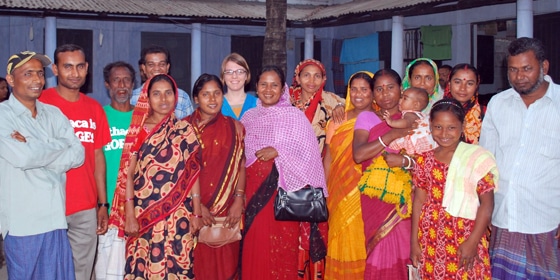
In the efforts to address poverty, the voices of those impacted by economic insecurity are too often conspicuously absent. The Goldin Institute's work builds on the experiences and perspectives of those living in poverty and designs solutions based on their knowledge, strategies and aspirations.
The current debate about the efficacy of microfinance is marked by the absence of those who have most at stake in the controversy: loan recipients. The Goldin Institute is working to lift up these voices, most often marginalized women, and restore their perspectives, insights and aspirations to the discussion.
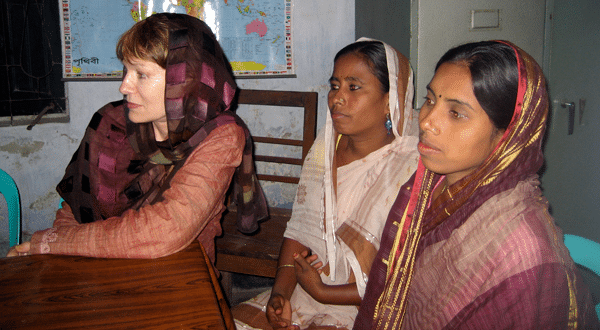
Our strategy for bringing their voices back in was simple: we decided to ask them. We adopted a strategy known as "oral testimony" which relies on extended semi-structured interviews to let participants tell their own stories in their own words, share their opinions and experiences and convey their own understandings of how development and poverty has transformed the history of their lives and villages.
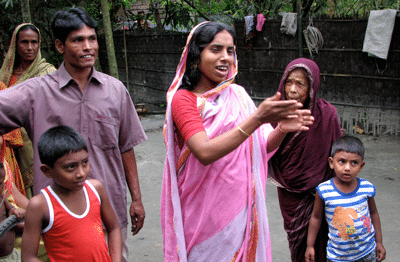
We wanted to take this approach a step further. Often oral testimony research is colored by power-dynamics between "researchers" and "subjects". Within these dynamics, answers to questions are often pre-determined by what each party expects to hear from the other. We decided to address this by inviting microcredit recipients in Arampur, a village in rural Northern Bangladesh, to interview each other about their own experiences with loans. We hoped that the content of these interviews would be shaped by mutual dialogue, rather than by top down agendas and expectations about what we, as researchers, wanted to hear.
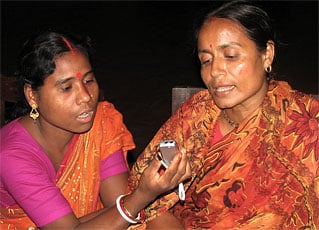
In order to do this, we trained a group of villagers in basic, qualitative research techniques and invited them to interview their peers and neighbors. The result was open-ended, conversation-style interviews, recorded using digital-audio recorders, in which the interviewees participated in directing the discussion by framing conversations through stories, life experiences and their own personal histories with microcredit lending organizations. Using this approach we heard what people had to say about microcredit on their own terms.
What are the advantages of this approach?
- The community researchers themselves were all microcredit loan recipients. They were able to give us early insight into the landscape of credit and poverty within the village. They participated in shaping and revising our research goals to better answer our questions about microcredit, as well as transforming the strategies we employed to accomplish them.
- As community members, they understood the best ways to conduct the work within the cultural context of rural Bangladesh. They understood what the best times to approach people were, how to make each interview session as comfortable for respondents as possible, how to best navigate the complexities of rural Bangladeshi household and gender power dynamics, and how to ask probing questions without crossing sensitive lines.
- Respondents were more comfortable speaking with their neighbors than they would be with a researcher from outside. Respondents did not have to explain taken for granted points. They did not have to couch their language or speaking style to be understandable to an outsider. Further, the semi and unstructured interview strategy allowed the respondents to direct the conversation, steering discussions to what they wished to talk about.
- Community researchers were better situated to explain and help us interpret stories and experiences as they were shared. They did this by recording audio field notes after every interview and by sharing their stories in daily debriefing sessions.
- Community researchers were able to elicit different kinds of responses and stories than those we could have gathered on our own. The stories shared by respondents were of a remarkably different kind than those that could or would have been shared with outside researchers. As such, the interviews collected by our fieldworkers contain different kinds of insights, stories, and critiques that shed a new light on microcredit in rural Bangladesh.
- Community researchers knew their community and therefore knew what questions to ask. They knew their respondents and were able to ask about specific incidents from their lives and histories. They could seek targeted information about their families and livelihoods. They knew the intimate details of cultural, agricultural, and political processes in the village. They were able to ask questions that pertained directly to local practices and histories.
Improving Microcredit in Bangladesh

In the efforts to address poverty, the voices of those impacted by economic insecurity are too often conspicuously absent. The Goldin Institute's work builds on the experiences and perspectives of those living in poverty and designs solutions based on their knowledge, strategies and aspirations.
Through the Goldin Institute's pioneering work on Community-Based Oral Testimony in Bangladesh, we are building new ways to improve poverty alleviation strategies, especially microcredit, from the perspective of the poor.

The current debate about the efficacy of microfinance is marked by the absence of those who have most at stake in the controversy: loan recipients. The Goldin Institute is working to lift up these voices, most often marginalized women, and restore their perspectives, insights and aspirations to the discussion.
We invite you to review the links on the right side of this page to learn more about the Goldin Institute's work on poverty alleviation in Bangladesh and around the world.
Study Shows Benefits of Child-Soldier Reintegration

A recent study published in Pediatrics points to the long-lasting payoffs to treating depression and anxiety in former child soldiers and other youth impacted by the civil war in Sierra Leone.
Lead author and director of the Research Program of Global Health and Population at the Harvard T.H. Chan School of Health, Theresa Betancourt, commented on the highlights of the study's findings:
[quote]We were surprised to see the large role that targeting symptoms of hopelessness and depression played across many years of observing war-affected youth. When offering health and other services for war-affected youth, we cannot leave mental health out of the equation."[/quote]
The Goldin Institute continues to stay engaged in this issue, and we are pleased to see that this study demonstrates the long-term benefits of providing reintegration programs for former child combatants, like our work through the National Partnership for Child Soldier Reintegration in Uganda and Colombia.
Please see our Child Soldier Map to find out more.
Youth Movement Key to Ending Conflict in Colombia
New Generation of Leaders in Colombia Offers Hope
This story about the emerging leaders in Colombia, reminded us of how the best opportunities for ending the conflict—and healing wounds left behind—lies with young people who have lived through the violence and best understand the solutions.
As the story reports on one group in particular making a difference in their community of Villavicencio called the Youth Roundtable:
The Youth Roundtable engaged in numerous consultations with its members—who include youth from rural and urban areas, members of indigenous communities, displaced young people and other marginalized groups—to identify needs and propose solutions.
 This is not unlike the Institute's own peace building work in Colombia through Global Associate Lissette Mateus Roa's work in the ESPERE project. Lissette continues to point the way towards young teachers, former combatants and community leaders providing the best hope for the country moving beyond the half-century long civil conflict and being in place to build on the promised peace treaty.
This is not unlike the Institute's own peace building work in Colombia through Global Associate Lissette Mateus Roa's work in the ESPERE project. Lissette continues to point the way towards young teachers, former combatants and community leaders providing the best hope for the country moving beyond the half-century long civil conflict and being in place to build on the promised peace treaty.
For more on Lissette's work, please click here.
Pope Francis and the Philippines
Pope Francis Supports the Peace Process in Mindanao
Although scheduling constraints prevented a direct visit to the Southern Philippines, Pope Francis made it clear that he endorses the ongoing peace process between the government and the Philippines' largest organized armed group, the Moro Islamic Liberation Front (MILF).
This came as very good news to our Global Associate Dr. Susana Anayatin, who has made it her work as one of the region's premiere peace activists to build and connect communities in Mindanao wishing to end the decades-long conflict.

Despite recognition of the accomplishments and hopes for an ultimate end to the conflict, in recent days there has been an uptick in violence between the National Police (PNP) and the Moro Islamic Liberation Front. This new outbreak in the southern province of Maguindanao, threatens passage of the Bangsamoro law, which many leaders feel would aid in bringing an end to the conflict. More on the current violence and the details of the law at jeopardy can be found here.
As always, we will continue to monitor the situation and provide insight from Dr. Anayatin directly.

